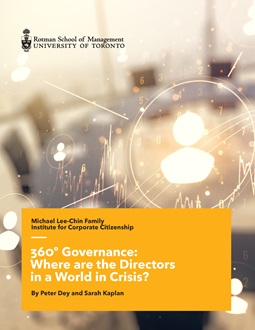
In 1994, the Toronto Stock Exchange (TSX) accepted a new set of guidelines for board governance as developed in the report “Where Were the Directors?”. Triggered by the mixed response by the Canadian corporate sector to the stresses of the 1990–1991 recession, the development of the guidelines (also known as the “Dey Report”) was meant to urge boards of directors to align with “growing expectations concerning the manner in which boards of directors are constituted, and the relationships between the board and shareholders.”
Two-and-a-half decades later, in the face of climate change, rising economic inequality, systemic racism and the COVID-19 pandemic, it is time for a new set of guidelines. To develop these new guidelines, we joined together to examine from a practical and scholarly standpoint what good governance in the 21st century should be. Peter Dey brings to this project his experience as a lawyer, regulator, investment banker and board member, as well as his background in developing the 1994 guidelines. Sarah Kaplan is author of The 360º Corporation: From Stakeholder Trade-offs to Transformation and brings her decade of experience as a management consultant as well as her current work as a business school professor to enrich the discussion with insights from scholarly research and management practice. Through several months of collaboration as well as broad consultations with academics and practitioners, we have come to a point of view reflected in “360º Governance: Where are the directors in a world in crisis?”.
While the 1994 guidelines—which concern best practices around board independence and oversight—continue to be relevant, they served the governance needs of the 1990s. We ask now, “Where are the directors in a world in crisis?” The guidelines we have developed in response to this question are based on the principle that companies must account for the interests of all stakeholders that surround them (hence, 360º Governance).
The document outlines and provides commentary on 13 guidelines on:
(1) Corporate Purpose
(2) The Board’s Duty
(3) The Definition of Stakeholders
(4) The Rights of Indigenous Peoples
(5) Reporting on Stakeholder Impact
(6) The Formation of a Stakeholder Committee
(7) Addressing Stakeholder Conflicts
(8) Executive Compensation Policies
(9) Board Refreshment
(10) Board Diversity
(11) Organizational Diversity
(12) Climate Change
(13) Corporate Activism
It also lists a number of resources for anybody looking to upgrade their board governance.
Download it here